2023 Legislative Session: Children’s Well-Being Bills
August 2023
The 2023 North Dakota Legislative Session wrapped up at the end of April where policymakers introduced 932 bills. A handful of these bills impacted child and family well-being, including investments in school meals and child care, a commitment to best practices in the child welfare system, and the desire to study ongoing needs for juvenile justice and mental health. Not every bill saw a win, and many bills that would have helped children and families did not make it through the process.
More than 180,000 children call North Dakota home, making up a quarter of the population in our state. North Dakota’s child population is also becoming increasingly diverse, with one in four children identifying as Black, Indigenous, or other person of color. Even though the legislative session has concluded, ongoing opportunities exist to impact policy during the interim and lead up to the next session in 2025. Supporting children and families should be an ongoing priority area for North Dakota lawmakers, especially policies that address disparities that exist among youth of color and LGBTQ+ youth.
Children and young adults who have been historically harmed and left out of policies experience worse well-being outcomes as a result. For example, American Indian children are disproportionately represented in the foster care system because of decades of harmful policies where the federal government intentionally separated American Indian families, with the intention of assimilating children into the western culture and beliefs. LGBTQ+ youth experience disproportionate mental health challenges as they navigate schools and health care providers that limit their access to care. To support the well-being of North Dakota youth, policymakers must continue to build on successes of the 2023 legislative session while also considering how to repair harmful policies that also passed.
$6 Million in Funding for School Meals Will Help 10,000 Students
School meals are an important source of healthy food for children of all incomes and play an important role for families struggling to afford enough food each month. In the 2022/23 school year, 35,211 students participated in the free or reduced-price meal program at a public school in North Dakota. During the COVID-19 pandemic, federal policy changes allowed schools to offer free meals to all students during the 2020-21 and 2021-22 school years but ended before the 2022-23 school year. With the federal changes for free meals ending, six states have passed policies to offer free meals to all students (California, Colorado, Maine, Minnesota, New Mexico, and Vermont).
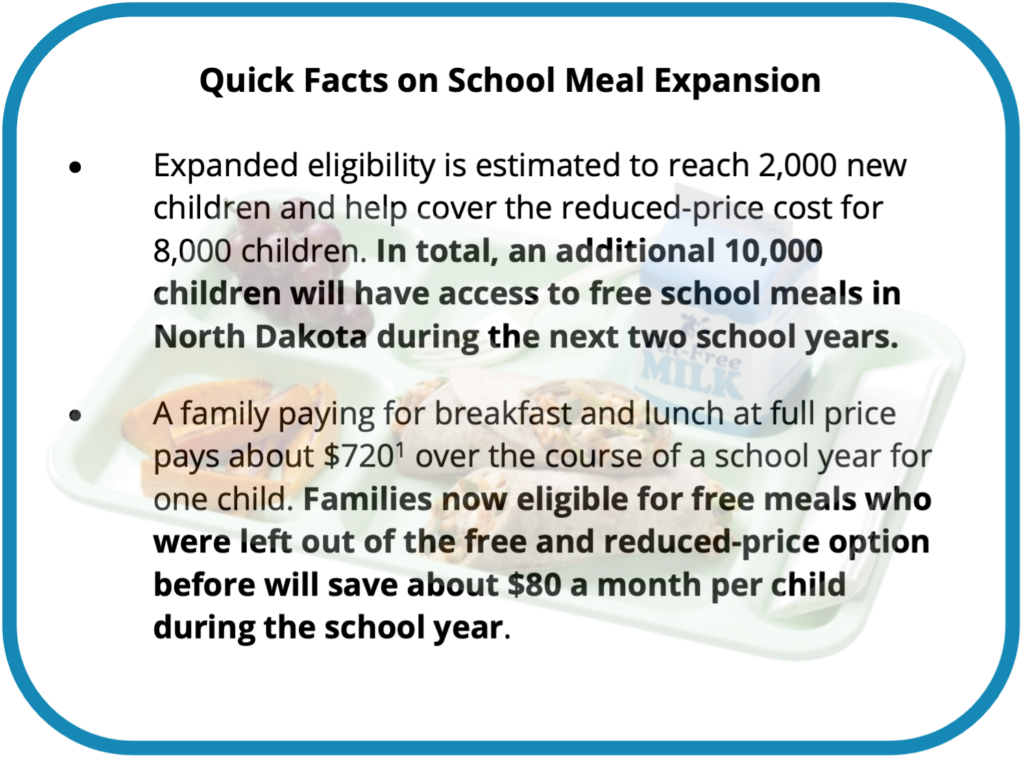
North Dakota passed two bills related to school meals during the 2023 session:
House Bill 1494 creates additional protections for students who access free or reduced-price school meals and students with unpaid school meal balances. This bill specifies that schools cannot deny offering a meal due to an unpaid balance, identify or stigmatize recipients of free or reduced-price lunches, or prohibit participation in school events due to an unpaid balance.
Senate Bill 2284 includes $6 million in one-time funding for providing school meals free of charge to students at or below 200 percent federal poverty level through the end of the 2024-25 school year. A family of four with income below $60,000 will qualify for free meals.
Expanding access to school meals supports racial equity and can help close the gap in economic and educational disparities among Black, Indigenous, and other children of color. Previously passed policies systematically limited opportunities for families of color with effects lasting generations and has resulted in present-day disparities in poverty rates for Black, Indigenous, and other children of color. Expanded eligibility for free school meals helps reach more families historically left out of economic support policies. With the expanded eligibility up to 200 percent of the federal poverty level, estimates show that 62 percent of American Indian children, 63 percent of Black children, and 38 percent of children identifying as Asian, Native Hawaiian, Other, or Multiple Race are now eligible for free school meals.1
The original sponsor of school meal legislation (House Bill 1491) intended to provide school meals to all students at no charge. Research has shown thatuniversal school meal policies are linked to better diet quality of students and improved school attendance for low-income students. An additional 81,000 students in North Dakota stand to benefit if school meals were provided to all students at no charge.2 Policymakers in North Dakota should consider how additional expansion of school meals would support the nutrition and economic outcomes for children and families across the state.
North Dakota Adopts State ICWA as Gold Standard for Child Protection
Lawmakers in North Dakota voted unanimously to pass House Bill 1536, which codifies the federal Indian Child Welfare Act (ICWA) into state law. ICWA is a federal law that prevents the unwarranted removal of American Indian children from their homes and keeps them connected to their families and culture when possible. Experts and practitioners at national child welfare agencies agree that ICWA is the gold standard because it promotes the best interests and unique needs of American Indian children. ICWA addresses and repairs past harm tribal communities endured through decades of harmful policies where the federal government intentionally separated American Indian families, trying to assimilate them into the dominant culture and beliefs.
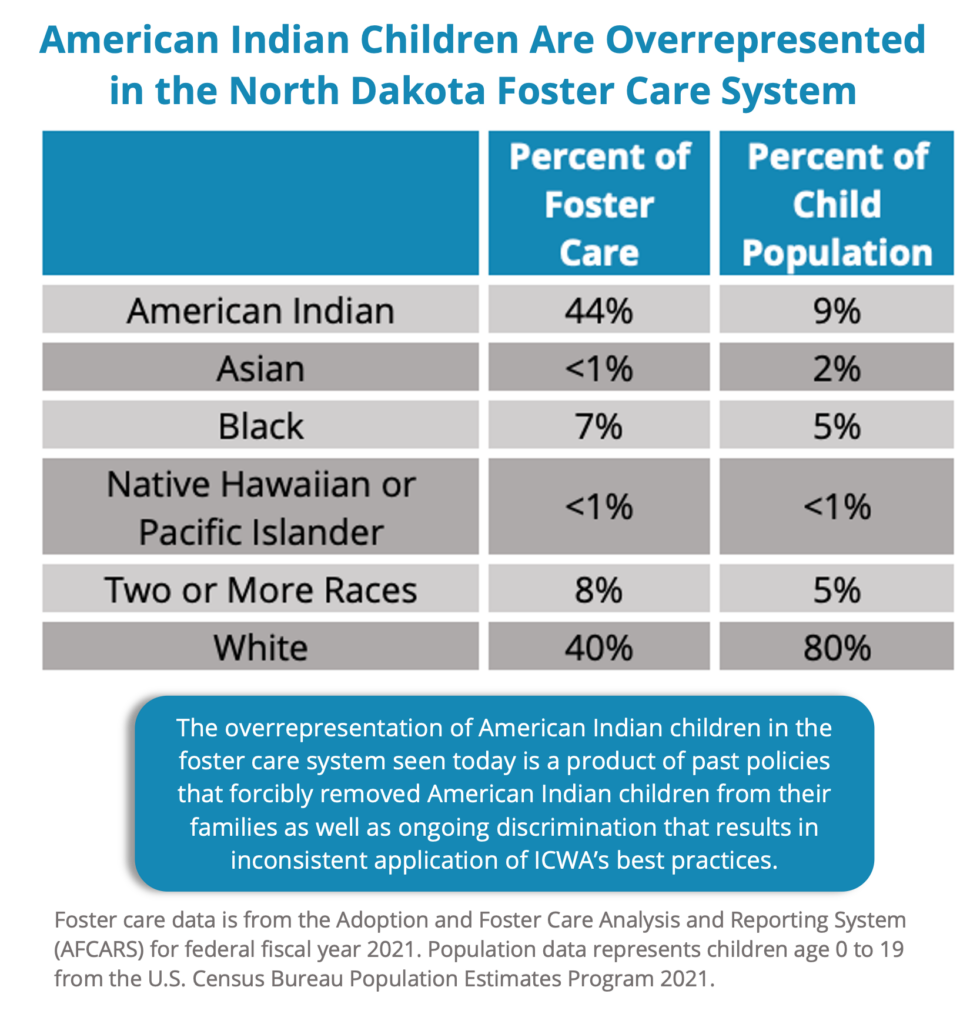
Still, American Indian children are overrepresented in the North Dakota foster care system. Despite American Indian children making up only 9 percent of the child population, they make up 44 percent of the foster care population in North Dakota. Present-day disparities in the foster care system are also a result of the federal government's failure to honor its trust responsibilities to provide services like health care, education, housing, and economic development in tribal communities. All families need access to stable income, food, safe housing, and health care to thrive.
The North Dakota state version of ICWA was designed to uphold the essence of the federal version by maintaining its most prominent protections.
HB 1536 requires:
- If an American Indian child is placed in a different living arrangement, the child is placed with a family member or tribal citizens of the child's tribal nation.
- The court system identifies and notifies the child's tribe to participate in providing support and services to the child and the family.
- Caseworkers show "active efforts" to provide remedial services to families to prevent American Indian children from being taken from their families.
Despite the added protections from ICWA, American Indian families are more likely to have their children removed from the home as a caseworker's first step and are less likely to be offered supportive interventions to keep a family together. ICWA faced challenges on the federal level with Haaland v. Brackeen. In June, the U.S. Supreme Court voted to uphold the federal Indian Child Welfare Act.
Policymakers Pass a $66 Million Investment in Child Care
Parents, child care providers, and businesses across North Dakota have continued to push policymakers for investments and solutions for the child care system. Many families struggle to pay for child care, where North Dakota families pay between $7,800 and $9,800 on average for child care, as expensive as in-state tuition at the University of North Dakota. At the same time, child care businesses must balance the true cost of providing high-quality care with what parents can afford. Because of this, many child care businesses operate on narrow margins and often cannot pay employees a fair wage. The median wage for a child care worker in North Dakota in 2022 was $12.86 per hour.
Policymakers passed a one-time investment of $66 million for child care for the 2023-25 biennium. This investment will make a difference for many families and child care providers. However, child care workers were largely left out of this funding at a time when recruiting and retaining a child care workforce is challenging at such low wages.
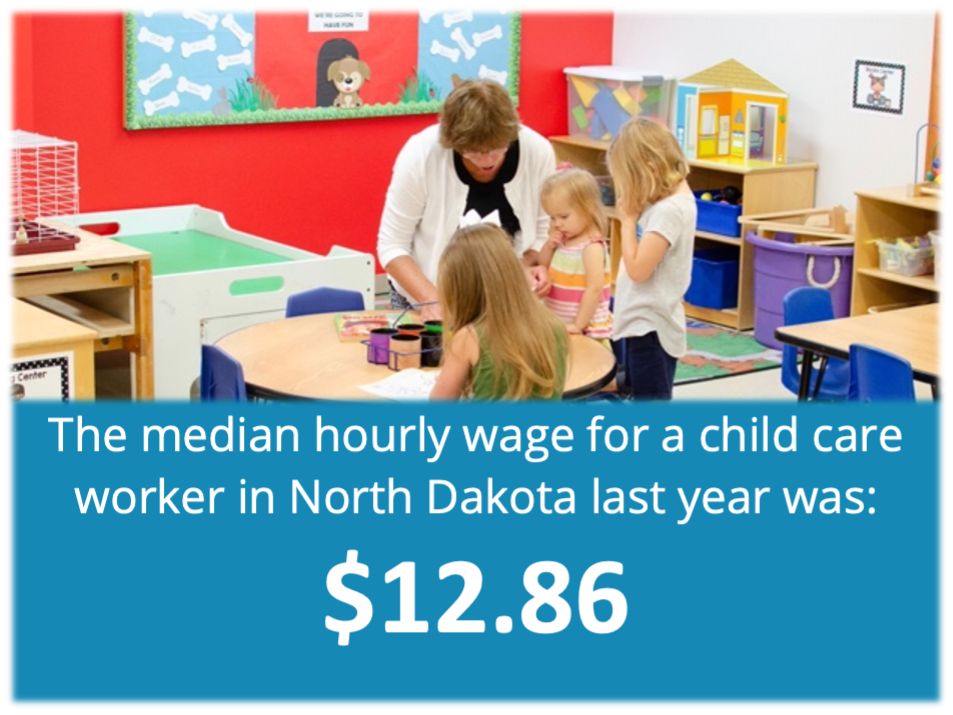
Senate Bill 2301 proposed investing $36 million over two years to create a stabilization program aimed to improve wages and benefits for child care workers. Senate Bill 2301 passed out of the Senate but was voted down in the House. Ahead of session, child care providers identified recruiting and retaining a workforce as one of the biggest challenges to keep their doors open or expand programs. Since an investment for the child care workforce did not pass this year, providers are not left with many options to offer better pay and benefits for their workers without passing on the cost to parents.
Policymakers did pass five bills related to child care and early childhood services during the 2023 session:
House Bill 1540 includes a one-time investment of $66 million for the 2023-25 biennium for child care assistance and early childhood services. House Bill 1540 also sets eligibility guidelines for the child care assistance program. Income eligibility for the child care assistance program is currently set at 85 percent of the state median. Eligibility will drop to 75 percent of the state median income no later than July 1, 2025, but may be sooner based on funding. House Bill 1540 also specifies that copayments are waived for families making less than 30 percent of the state median income.
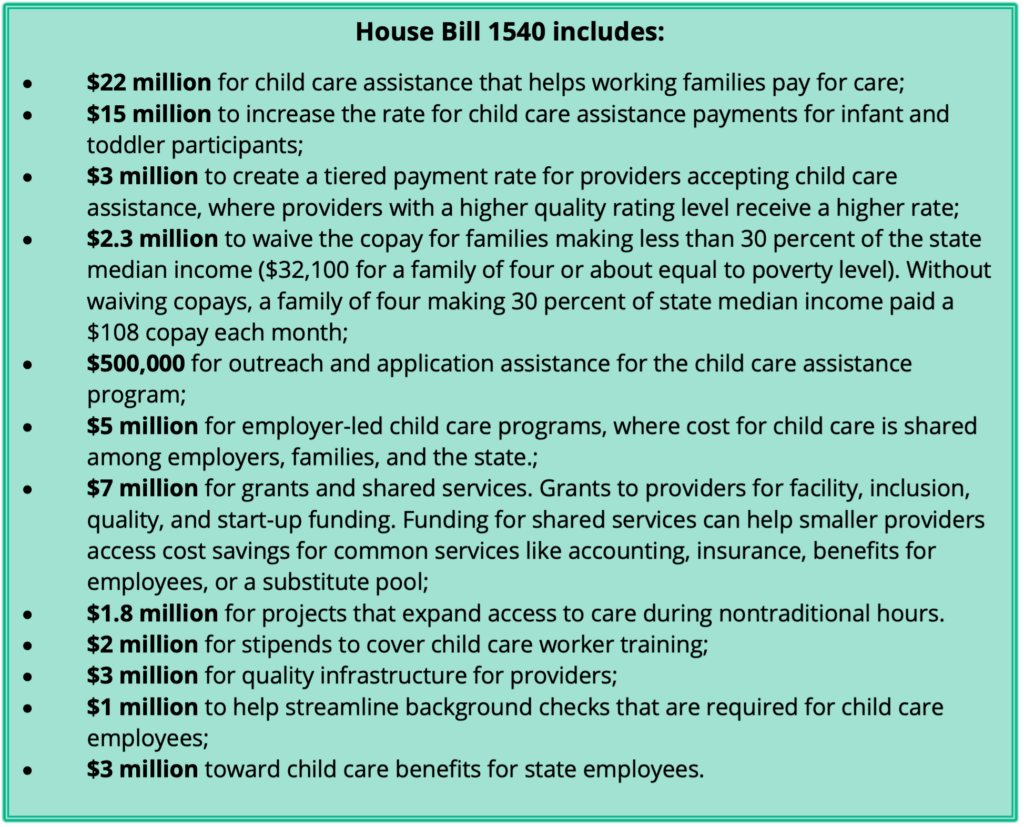
Senate Bill 2012 removed the expiration date for the Best in Class grants that fund early childhood programs for four-year-old children. The Best in Class program was set to expire at the end of the 2023-25 biennium after originally passing during the 2021 session. A total of $14.4 million was allocated for evidence-based programs for four-year-old children, including $12 million to expand the Best in Class grants and $2.4 million to continue the Waterford Upstart program. This bill also included a proposal for a legislative management study on early childhood programs and services during the 2023-24 interim and was chosen as an interim study for the Human Services Committee.
Senate Bill 2238 appropriates $300,000 for two staff positions and supplies needed to process background checks and proposes a legislative management study on background checks that was chosen as an interim study for the Juvenile Justice Committee. Hiring a child care employee requires a background check before starting employment. A long wait for the results of a background check for a new hire is a challenge for many child care providers as they fill staff openings.
Senate Bill 2084 directs payments for the child care assistance program directly to child care providers monthly instead of having the option for payments to go to parents first.
Senate Bill 2104 updates the definition of the Best in Class program to be inclusive of children the year before kindergarten and includes Head Start programs as eligible for support. The bill also specifies that all children under age 12 must be counted for regulation determination and adds staff training and professional development incentives as a workforce development program.
Senate Bill 2182 specifies that child care programs certified with the U.S. Department of Defense are not required to be regulated by the state.
Policymakers introduced other bills related to child care that did not pass. Senate Bill 2190 proposed streamlining the application for SNAP and Medicaid as part of the child care assistance application. Senate Bill 2237 would have established a new child care tax credit for families making less than $120,000.
Policymakers Updated the Juvenile Court Act to Better Support Youth
Last year, 3,413 youth were referred to Juvenile Court because of alleged delinquent behavior (an action considered a crime if they were an adult). How youth interact with the Juvenile Court system is governed by the Juvenile Court Act. The Juvenile Court Act aims to address the unique needs of children that are referred to Juvenile Court using an approach that prioritizes a child’s development, restorative justice, and effectiveness. The updates made to the Juvenile Court Act during the 2023 session help make improvements to how youth interact within the legal system.
House Bill 1137 makes updates to the Juvenile Court Act including:
- Removes the requirement that the court charges a fee to families when youth receive court-appointed counsel in a delinquent case. The fee is now optional for courts to charge.
- Allows sharing court history information with a juvenile detention or intake center to complete detention screening tools with the aim of using detention only for youth that pose a risk to public safety.
- Created a new statute that allows schools to address certain low-level delinquent behaviors without needing to involve the justice system and clarifies which behaviors causing public safety concerns should be referred to Juvenile Court.
- Removes the requirement to exhaust all probation extensions before a youth is placed with the Division of Juvenile Services, but the placement must still be made on a risk and needs assessment.
House Bill 1195 requires a legislative management study on the juvenile justice system in North Dakota including the feasibility of a separate juvenile offense code. The interim Juvenile Justice Committee will include study of the juvenile justice system as part of their 2023-24 interim work.
House Bill 1263 adds individual justice plans as a process to identify consequences for behaviors caused by or related to an individual’s mental health. The director of Juvenile Court can use individual justice plans as part of their tools for working with youth referred to Juvenile Court.
As policymakers continue to study how youth in North Dakota interact with the criminal legal system, an important focus on racial equity is needed. American Indian and Black youth are overrepresented in referrals to juvenile court. American Indian youth make up 17 percent of delinquency referrals and Black youth make up 14 percent of delinquency referrals despite making up only 11 percent and 6 percent of the population. More data is needed to understand how the juvenile justice system responds to the disproportionate representation of youth of color. For example, national research shows that youth of color are less likely to be diverted from juvenile court compared to white youth, further perpetuating their disproportionate involvement with the justice system.
Youth Mental Health as an Area for Continued Focus
Mental health is an ongoing area of concern for children and young adults in North Dakota. Nearly one in three high school students in North Dakota reported feeling sad or hopeless almost every day for two or more weeks in a row. More than 11 percent of children and teens experience anxiety or depression in North Dakota. A proposal for an interim study on mental health care for children was chosen for the Human Services Committee and is a first step in helping improve mental health services for youth in the state. Policymakers also included $1.86 million in funding for supporting the suicide and crisis hotline available to North Dakotans, included in Senate Bill 2012.
House Continuing Resolution 3017 proposed an interim study on mental health care for children and whether current services meet the need in North Dakota. This study will be a focus for the Human Services Committee during the 2023-24 interim.
While policymakers chose to study the mental health care needs of youth, they simultaneously passed bills that harm LGBTQ+ youth across the state. According to the Youth Risk Behavior Survey, 17 percent of middle and high school students in North Dakota identified as sexually diverse or questioning their sexual orientation and 4 percent identified as transgender or questioning their gender. The disparities for mental health challenges that transgender and sexually diverse students face are alarming. In 2021, 71 percent of lesbian, gay, or bisexual high school students and 66 percent of transgender students reported feeling sad or hopeless almost every day for two weeks in the last year, compared to 33 percent for straight students. Policies that discriminate, like those listed below, make it more challenging for LGBTQ+ youth to seek care and risk worsening the already alarming mental health challenges they face.
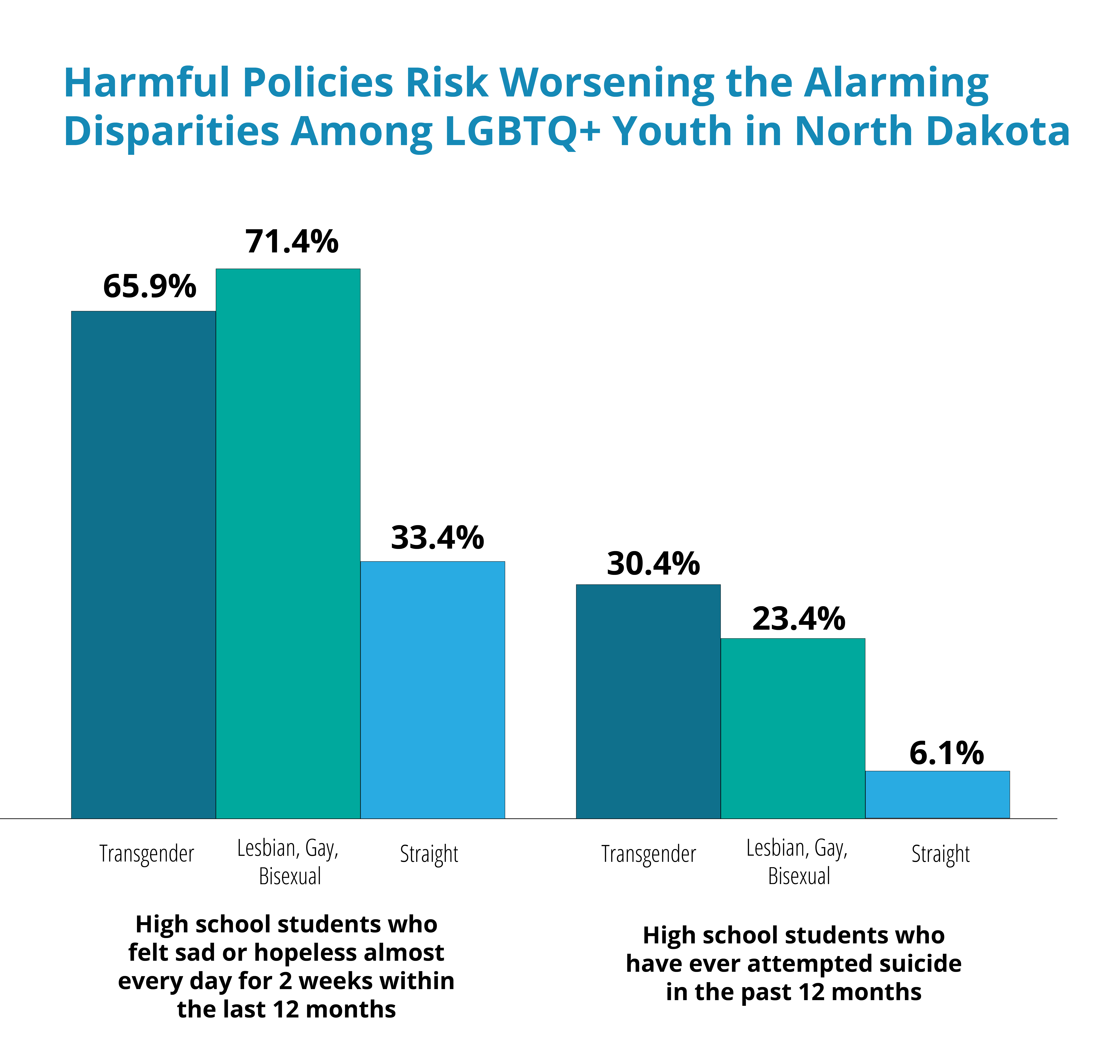
House Bill 1254 criminalizes providing medical care to transgender youth for the purpose of changing or affirming a child’s perception of their sex.
House Bill 1522 prevents schools from requiring the use of preferred pronouns, requires schools to create a plan for transgender students using separate bathrooms, and states that schools or teachers cannot withhold information about a student’s transgender status from parents.
One additional area of support for mental health is to ensure pregnant and postpartum women have access to health care coverage through programs like Medicaid. In North Dakota, 23 percent of all births are covered by Medicaid. With one in seven women reporting depressive symptoms after giving birth, ongoing coverage for Medicaid during the postpartum period is critical for supporting maternal mental health services. Policymakers passed a bill during the 2023 session to ensure more pregnant and postpartum women have access to Medicaid.
Senate Bill 2181 increases Medicaid eligibility for pregnant participants to 175 percent of the federal poverty level (increased from 162 percent) and is estimated to expand Medicaid coverage to approximately 300 more pregnant women. This bill also includes language to ensure Medicaid coverage lasts for 12 months postpartum for pregnant women. Federal rules require Medicaid coverage continue for pregnant women into postpartum for at least 60 days after giving birth, but North Dakota requested a State Plan Amendment that went into effect at the beginning of 2023 to extend coverage to 12 months.
With the end of the 2023 session, interim committees will start to meet and continue conversations on many of the topics highlighted in this report that impact children and families. The interim leading up to the 2025 session is an opportunity for policymakers to build on successes of this year while continuing to consider how to repair harmful policies that passed.
Footnotes
- U.S. Cens Bureau, American Community Survey, Analysis of Public Use Microdata for 2017-2021 data.
- The total enrollment used to calculate free and reduced-price participation in the 2022-23 school year of 118,330 minus those eligible during the prior school year (35,211) minus newly eligible students from Senate Bill 2284 (2,000) estimates that an additional 81,119 students could be eligible.

